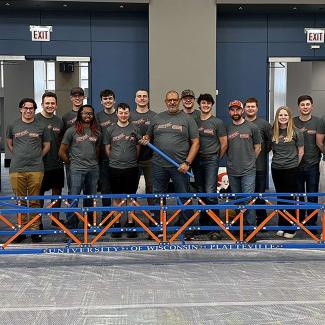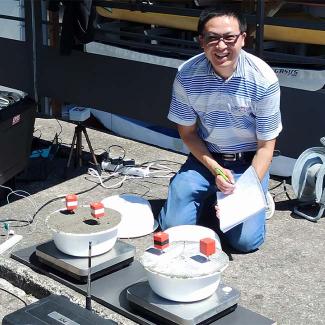What you'll learn studying Civil Engineering at UW-Platteville
Earn your civil engineering degree in Wisconsin at UW-Platteville, where you will gain the skills and experience you need to succeed in your future career. As a student with the Department of Civil and Environmental Engineering, you will learn to design, build, and maintain the foundations for our modern society, which allows us to drink clean water, drive on roads and bridges, access airports, and enjoy everyday conveniences.
At UW-Platteville, you will develop your analytical skills, learn how to explain design ideas and plans, and gain confidence in your decision-making skills. Ultimately, civil engineering major courses prepare graduates for meaningful careers at the local, state, and federal levels, as well as with private consulting firms. Our B.S. in Civil Engineering degree also provides the starting point in the pathway to earning a Professional Engineer designation.
Additionally, our degree program is accredited by the Engineering Accreditation Commission of ABET, https://www.abet.org, under the commission’s General Criteria and the Program Criteria for Civil and Similarly Named Engineering Programs.
View the Civil Engineering Program’s Student Outcomes and Program Educational Objectives.
Careers in Civil Engineering
Civil engineers play a vital role in designing, constructing, and maintaining infrastructure that keeps our communities functioning and thriving. They are responsible for ensuring that public and private systems are safe, sustainable, and efficient, all while balancing factors like government regulations, environmental considerations, and cost constraints.
Civil engineering careers offer diverse opportunities, allowing professionals to specialize in areas such as planning, design, construction, research, and education. Whether working for consulting firms, government agencies, or utility companies, civil engineers contribute to projects that require a unique blend of technical expertise and problem-solving skills. Some of the infrastructure projects they may work on include:
- Airports and transit systems
- Bridges and tunnels
- Buildings and skyscrapers
- Dams and levees
- Roads and highways
- Water supply and wastewater treatment systems
Potential career opportunities include:
- Construction manager
- Design engineer
- Educator
- Facilities engineer
- Inventor
- Planner
- Project manager
- Researcher
Civil engineers often spend time in offices planning and designing projects, but many also work on-site to oversee construction, monitor progress, and address challenges in real time. This dynamic combination of fieldwork and office work ensures that civil engineering professionals remain engaged and adaptable throughout their careers.

Discover by doing
When you pursue a bachelor of science in civil engineering, you will have access to learning opportunities both inside the classroom and through research, internships, and events at the university.
UW-Platteville students, through Engineers Without Borders, are impacting Ghana by building a junior high school in Adumasa to improve education, create opportunities, and provide hands-on experience.







